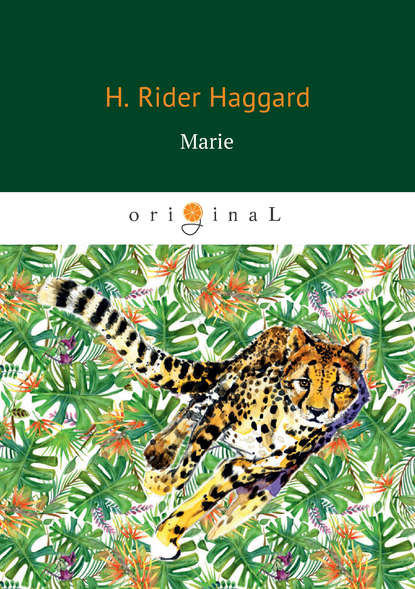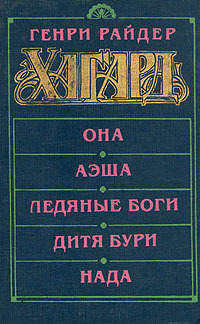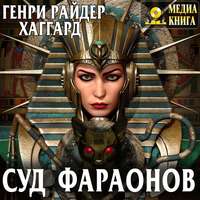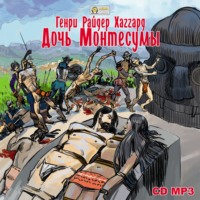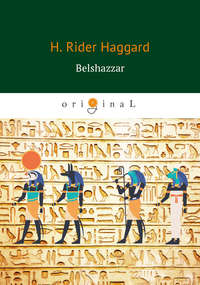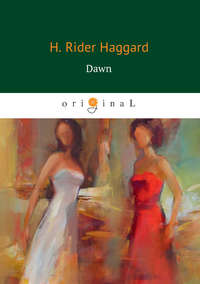
Полная версия
Allan and the Ice-Gods
An expression of joy spread over Wi’s face as he listened.
“Your words give me strength,” he said, “and now I go out to summon the People and to tell them that I am about to challenge Henga to fight to the death.”
“Go,” she said, “and hear me, my man. Fight you without fear, for if my rede be wrong and Henga the Mighty should kill you, what of it? Soon we die, all of us, for the most part slowly by hunger or otherwise, but death at the hands of Henga will be swift. And if you die, then we shall die soon, very soon. Pag will see to it, and so we shall be together again.”
“Together again! Together where, Wife?” he asked, staring at her curiously.
A kind of veil seemed to fall over Aaka’s face, that is, her expression changed entirely, for it grew blank and wooden, secret also, like to the faces of all her sisters of the tribe.
“I don’t know,” she answered roughly. “Together in the light or together in the dark, or together with the Ice-gods – who can tell? At least together somewhere. You shake your head. You have been talking to that hater of the gods and changeling, Pag, who really is a wolf, not a man, and hunts with the wolves at night, which is why he is always so fat in winter when others starve.”
Here Wi laughed incredulously, saying:
“If so, he is a wolf that loves us; I would that we had more such wolves.”
“Oh! you mock, as all men do. But we women see further, and we are sure that Pag is a wolf by night, if a dwarf by day. For, if any try to injure him, are they not taken by wolves? Did not wolves eat his father, and were not the leaders of those women who caused him to be driven forth to starve when there was such scarcity that even the wolves fled far away, afterward taken by wolves, they or their children?”
Then, as though she thought she had said too much, Aaka added:
“Yet all this may be but a tale spread from mouth to mouth, because we women hate Pag who mocks us. At least he believes in naught, and would teach you to do the same, and already you begin to walk in his footsteps. Yet, if you hold that we live no more after our breath leaves us, tell me one thing. Why, when you buried Fo-a yonder, did you set with her in the hole her necklace of shells and the stone ball that she played with and the tame bird she had, after you killed it, and her winter cloak, and the doll you made for her of pinewood last year? Of what good would these things be to her bones? Was it not because you thought that they and the little stone ax might be of use to her elsewhere, as the dried fish and the water might serve to feed her?”
Here she ceased, and stared at him.
“Sorrow makes you mad,” said Wi, very gently, for he was moved by her words, “as it makes me mad, but in another fashion. For the rest, I do not know why I did thus; perhaps it was because I wished to see those things no more, perhaps be cause it is a custom to bury with the dead what they loved when they were alive.”
Then he turned and left the hut. Aaka watched him go, muttering to herself:
“He is right. I am mad with grief for Fo-a and with fear for Foh; for it is the children that we women love, yes, more than the man who begat them; and if I thought that I should never find her again, then I would die at once and have done. Meanwhile, I live on to see Wi dash out the brains of Henga, or, if he is killed, to help Pag poison him. They say that Pag is a wolf, but, though I hate him of whom Wi thinks too much, what care I whether he be wolf or monster? At least he loves Wi and our children and will help me to be revenged on Henga.”
Presently she heard the wild-bull horn that served the tribe as a trumpet being blown, and knew that Wini-wini, he who was called the Shudderer because he shook like a jellyfish even if not frightened, which was seldom, was summoning the people that they might talk together or hear news. Guessing what that news would be, Aaka threw her skin cloak about her and followed the sound of the horn to the place of assembly.
Here, on a flat piece of ground at a distance from the huts that lay about two hundred paces from a cliff-like spur of the mountain, all the people, men, women, and children, except a few who were in childbed or too sick or old to move, were gathering together. As they walked or ran, they chattered excitedly, delighted that something was happening to break the terrible sadness of their lives, now and again pointing toward the mouth of the great cave that appeared in the stone cliff opposite to the meeting place. In this cave dwelt Henga, for by right, from time immemorial, it was the home of the chiefs of the tribe, which none might enter save by permission, a sacred place like to the palaces of modern times.
Aaka walked on, feeling that she was being watched by the others but taking no heed, for she knew the reason. She was Wi’s woman, and the rumour had run round that Wi the Strong, Wi the Great Hunter, Wi whose little daughter had been murdered, was about to do something strange, though what it might be none was sure. All of them longed to ask Aaka, but there was something in her eye which forbade them, for she was cold and stately and they feared her a little. So she went on unmolested, looking for Foh, of whom presently she caught sight walking in the company of Pag, who still had the reeking wolfskin on his shoulders, of which, as he was short, the tail dragged along the ground. She noted that, as he advanced, the people made way for him, not from reverence or love, but be cause they feared him and his evil eye.
“Look,” said one woman to another in hearing, “there goes he who hates us, the spear-tongued dwarf.”
“Aye,” answered the other. “He is in such haste that he has forgotten to take off the wolf’s hide he hunted in last night. Have you heard that Buk’s wife has lost her little child of three? It is said that the bears took it, but perhaps yonder wolfman knows better.”
“Yet Foh does not fear him. Look, he holds his hand and laughs.”
“No, because – ” Here suddenly the woman caught sight of Aaka and was silent.
“I wonder,” reflected Aaka, “whether we women hate Pag be cause he is ugly and hates us, or because he is cleverer than we are and pierces us with his tongue. I wonder also why they all think he is half a wolf. I suppose it is because he hunts with Wi, for how can he be both a man and a wolf? At least, I too believe that report speaks truth and that he and the wolves have dealings together. Or perhaps he puts the tale about that all may fear him.”
She came to the meeting ground and took her stand near to Foh and Pag among the crowd which stood or sat in a ring about an open space of empty ground where sometimes the tribe danced when they had plenty of food and the weather was warm, or took counsel, or watched the young men fight and wrestle for the prize of a girl they coveted.
At the head of the ring, which was oblong in shape rather than round, standing about Wini-wini the Shudderer, who from time to time still blew blasts upon his horn, were some of the leaders of the tribe, among them old Turi the Avaricious, the hoarder of food who was always fat, whoever grew thin; and Pitokiti the Unlucky with whom everything went wrong, whose fish always turned rotten, whose women deserted him, whose children died, and whose net was sure to break, so that he must be supported by others for fear lest he should die and pass on his ill-luck to them who neglected him; and Whaka the Bird-of-Ill-Omen, the lean-faced one who was always howling of misfortunes to come; and Hou the Unstable, a feather blown by the wind, who was never of the same mind two days together and Rahi the Rich, who traded in stone axes and fish hooks and thus lived well without work; and Hotoa, the great-bellied and slow-speeched, who never gave his word as to a matter until he knew how it was settled, and then shouted it loudly and looked wise; and Taren, She-Who-hid, with N’gae the priest of the Icegods and the magician who told fortunes with shells, and only came out when there was evil in the wind.
Lastly there was Moananga, Wi’s younger brother, the brave, the great fighter who had fought six men to win and keep Tana, the sweet and loving, the fairest woman of the tribe, and killed two of them who strove to steal her by force. He was a round-eyed man with a laughing face, quick to anger but good-tempered, and after Wi the Hunter, he who stood first among the people. Moreover, he loved Wi and clung to him, so that the two were as one, for which reason Henga the chief hated them both and thought that they were too strong for him.
All these were talking with their heads close together, till presently appeared Wi, straight, strong, and stern, at whose coming they grew silent. He looked round at them, then said:
“I have words.”
“We are listening,” replied Moananga.
“Hearken,” went on Wi. “Is there not a law that any man of the tribe may challenge the chief of the tribe to fight, and if he can kill him, may take his place?”
“There is such a law,” said Urk, the old wizard, he who made charms for women and brewed love potions, and in winter told stories of what had happened long ago before his grandfather’s grandfather was born, very strange stories, some of them. “Twice it has chanced in my day, the second time when Henga challenged and killed his own father and took the cave.”
“Yes,” added Whaka the Bird-of-Ill-Omen, “but if he who challenges is defeated, not only is he killed, his family is killed also” – here he glanced at Aaka and Foh – “and perhaps his friend or brother” – here he looked at Moananga. “Yes, without doubt that is the law. The cave only belongs to the chief while he can defend it with his hands. If another rises who is stronger than he, he may take the cave, and the women, also the children if there are any, and kill them or make them slaves, until his strength begins to fail him and he in turn is killed by some mightier man.”
“I know it,” said Wi. “Hearken again. Henga has done me wrong; he stole and murdered my daughter Fo-a. Therefore I would kill him. Also he rules the tribe cruelly. No man’s wife or daughter or robe or food is safe from him. His wickedness makes the gods angry. Why is it that the summers have turned cold and the spring does not come? I say it is because of the wickedness of Henga. Therefore, I would kill him and take the cave, and rule well and gently so that every man may have plenty of food in his hut and sleep safe at night. What say you?”
Now Wini-wini the Shudderer spoke, shaking in all his limbs:
“We say that you must do what you will, Wi, but that we will not mix with the matter. If we mix, when you are killed, as you will be – for Henga is mightier than you – yes, he is the tiger, he is the bull of the woods, he is the roaring bear – then he will kill us also. Do what you will, but do it alone. We turn our backs on you, we put our hands before our eyes and see nothing.”
Pag spat upon the ground and said in his low, growling voice that seemed to come out of his stomach:
“I think that you will see something one night when the stars are shining. I think, Wini-wini, that one night you will meet that which will make you shudder yourself to pieces.”
“It is the wolf-man,” exclaimed Wini-wini. “Protect me! Why should the wolf-man threaten me when we are gathered to talk?”
Nobody answered, because if some were afraid of Pag, all, down to the most miserable slave-woman, despised Wini-wini.
“Take no heed of his words, Brother,” said Moananga the Happy-faced. “I will go up with you to the cave-mouth when you challenge Henga, and so I think will many others to be witnesses of the challenge, according to the custom of our fathers. Let those stop behind who will. You will know what to think of them when you are chief and sit in the cave.”
“It is well,” said Wi. “Let us go at once.”
Chapter 5
The Ax that Pag Made
This matter being settled, there followed a jabber of argument as to the method of conveying the challenge of Wi to Henga the chief. Urk the Aged was consulted as to precedents and made a long speech in which he contradicted himself several times. Hou the Unstable sprang up at length and said that he was not afraid and would be the leader. Suddenly, however, he changed his mind, declaring he remembered that this office by right belonged to Wini-wini the Horn-Blower, who must sound three blasts at the mouth of the cave to summon the chief. To this all assented with a shout, perhaps because there was a sense of humour even in their primitive minds, and protest as he would, Wini-wini was thrust forward with his horn.
Then the procession started, Wini-wini going first, followed close behind by Pag in the bleeding wolfskin, who, from time to time, pricked him in the back with his sharp flint knife to keep him straight. Next came Wi himself with his brother Moananga, and after these the elders and the rest of the people.
At least, they started thus to cover the three hundred paces or so which lay between them and the cliff, but before they reached the cave, most of them lagged behind so that they were dotted in a long line reaching from the meeting place to its entrance.
Indeed, here remained only Wini-wini, who could not escape from Pag, Wi, Moananga, and, at a little distance behind, Whaka the Bird-of-Ill-Omen, prophesying evil in a ceaseless stream of words. At his side, too, was Aaka, walking boldly and looking down at his withered shape with scorn. Of the remainder, the bravest, drawn by curiosity, kept within hearing, but the rest stayed at a distance or hid themselves.
“Blow!” growled Pag to Wini-wini and, as he still hesitated, pricked him in the back with his knife.
Then Wini-wini blew a quavering blast.
“Blow again louder,” said Pag.
Wini-wini set the horn to his lips, but before a sound came out of it, a large stone hurled from the cave struck him in the middle and down he went, writhing and gasping.
“Now you have something to shake for,” said Pag, as he waddled to one side lest another stone should follow.
None came, but out of the cave with a roar rushed a huge, hairy, black-browed fellow waving a great wooden club – Henga himself. He was a mighty, thick limbed man of about forty years of age, with a chest like a bull’s, a big head from which long black hair fell upon his shoulders, and a wide, thick-lipped mouth whence projected yellow tusk-like teeth. From his shoulders, in token of his rank, hung the hide of a cave tiger and round his neck was a collar made from its claws and teeth.
“Who sends that dog to waken me from my rest?” he shouted in his bellowing voice, and pointed with the club to Wini-wini, twisting on the ground.
“I do,” answered Wi, “I and all the people. I, Wi, whose child you murdered, come to challenge you, the chief, to fight me for the rule of the tribe, as you must do according to the law, in the presence of the tribe.”
Henga ceased from his shouting and glared at him.
“Is it so?” he asked in a quiet voice that had in it a hiss of hate. “Know that I hoped that you would come on this errand and that is why I killed your brat to give you courage, as I will kill the other that remains to you,” and he glanced at the boy Foh who stood at a distance. “You have troubled me for long, Wi, with your talk and threats against me, of which I am hungry to make an end. Now, tell me, when does it please the people to see me break your bones?”
“When the sun is within an hour of its setting, Henga, for I have a fancy to sleep in the cave to-night as chief of the people,” answered Wi quietly.
Henga glowered at him, gnawing at his lip, then said:
“So be it, dog. I shall be ready at the meeting place an hour before the sun sets. For the rest, it is Aaka who will sleep in the cave to-night, not you who I think will sleep in the bellies of the wolves. Now begone, for a salmon has been sent to me, the first of the year, and I who love salmon would cook and eat it.”
Then Aaka spoke, saying:
“Eat well, devil-man who murders children, for I, the mother, tell you that it shall be your last meal.”
Laughing hoarsely, Henga went back into the cave, and Wi and all the others slipped away.
“Who gave Henga the salmon?” asked Moananga idly, as one who would say something.
“I did,” answered Pag, who was walking beside him but out of earshot of Wi. “I caught it last night in a net and sent it to him, or rather caused it to be laid on a stone by the mouth of the cave.”
“What for?” asked Moananga.
“Because Henga is greedy over salmon, especially the first of the year. He will eat the whole fish and be heavy when it comes to fighting.”
“That is clever; I should never have thought of that,” said Moananga. “But how did you know that Wi was going to challenge Henga?”
“I did not know, nor did Wi. Yet I guessed it because Aaka sent him to consult the gods. When a woman sends a man to seek a sign from the gods, that sign will always be the one she wishes. So at least she will tell him, and he will believe.”
“That is cleverer still,” said Moananga, staring at the dwarf with his round eyes. “But why does Aaka wish Wi to fight Henga?”
“For two reasons. First, because she would revenge the killing of her child, and, second, because she thinks that Wi is the better man, and that presently she will be the wife of the chief of the tribe. Still, she is not sure about this, because she has made a plan, should Wi be defeated, that I must kill her and Foh at once, which I shall do before I kill myself. Or perhaps I shall not kill myself, at any rate, until I have tried to kill Henga.”
“Would you then be chief of the tribe, Wolf-man?” asked Moananga, astonished.
“Perhaps, for a little while; for do not those who have been spat upon and reviled always wish to rule the spitters and the revilers? Yet I will tell who are Wi’s brother and love him that, if he dies, I, who love him better and love no one else, save perhaps Foh, because he is his son, shall not live long after him. No, then I should pass on the chieftainship to you, Moananga, and be seen no more, though perhaps in the after years you might hear me at night howling round the huts in winter – with the wolves, Moananga, to which fools say I belong.”
Moananga stared again at this sinister dwarf whose talk frightened him. Then, that he might talk of something else, asked him:
“Which of these two do you think will conquer, Pag?”
Pag stopped and pointed to the sea. At some distance from the shore a mighty struggle was in progress between a thresher shark and a whale. The terrible shark had driven the whale into shallow water, where it floundered, unable to escape by sounding. Now the sea wolf, as it is called, was leaping high in to the air, and each time as it fell it smote the whale upon the head with its awful sword-like tail, blow upon blow that echoed far and wide. The whale rolled in agony, beating the water to a foam with its giant flukes, but for all its size and bulk could do nothing. Presently, it began to gasp and opened its great mouth, whereon the thrasher, darting between its jaws, seized its tongue and tore it out. Then the whale rolled over and began to bleed to death.
“Look,” said Pag. “There is Henga the huge and mighty and there is Wi the nimble, and Wi wins the day and will feed his fill upon whale’s flesh, he and his friends. That is my answer, and the omen is very good. Now I go to make Wi ready for this battle.”
When Pag reached the hut, he sent Aaka and Foh out of it, leaving himself alone with Wi. Then, causing Wi to strip off his cloak, he made him lie down and rubbed him all over with seal oil. Also, with a sharp flint and a shell ground to a fine edge, slowly and painfully he cut is hair short, so short that it could give no hold to Henga’s hand, and, this done, greased what remained of it with the seal oil. Next he bade Wi sleep awhile and left the hut, taking with him Wi’s stone ax, also his spear, that with which he had killed the wolf, and his flint knife that was hafted with two flat pieces of ivory rubbed down from a walrus tusk and lashed onto the end of the flint.
Outside the hut, he met Aaka, who was wandering to and fro in an ill-humour. She made as though she would pass him, set ting her face toward the hut.
“Nay,” said Pag, “you do not enter.”
“Why not?” she asked.
“Because Wi rests and must not be disturbed.”
“So a misshapen monster, a wolf-man hated of all, who lives on bounty, may enter my husband’s hut, when I, the wife, may not,” she said furiously.
“Yes, for presently he goes upon a man’s business, namely, to kill his enemy or be killed of him, and it is best that no woman should come near to him till the thing is ended.”
“You say that because you hate women, who will not look on you, Pag.”
“I say it because women take away the strength of men and suck out their courage and disturb them with weak words.”
She leapt to one side as though to rush past him, but Pag leapt also, lifting the spear in his hand, whereon she stopped, for she feared the dwarf.
“Listen,” he said. “You do ill to reproach me, Aaka, who am your best friend. Still, I do not blame you overmuch for I know the reason of your hate. You are jealous of me because Wi loves me more than he does you, as does Foh, if in another fashion.”
“Loves you, you abortion, you hideous one!” she gasped.
“Yes, Aaka, who, it seems, do not know that there are different sorts of love, that of the man for the woman which comes and goes, and that of man for man which changes not. I say that you are jealous. Only this day I told Wi that, if he had not taken me with him hunting but had left me to watch Fo-a, she would not have been stolen and killed by yonder cave dweller. It was a lie. I could have refused to go hunting with Wi and he would have let me be, who knows that always I have a reason for what I do. I went with him because of words which you had spoken which you will remember well. I told you that Fo-a was in danger from Henga the cave-dweller and that I had best watch her, and you said that no girl child of yours should be watched by a wolf’s cub and that you would take care of her yourself, which you did not do. Therefore, because you goaded me, I went hunting and Fo-a was taken and killed.”
Now Aaka hung her head, answering nothing, for she knew that his words were true.
“Let that be,” went on Pag. “The dead are dead, and well dead, perchance. Now, although I speak wisely to you, you would thwart me again and go in to awaken Wi, even when I tell you that to do so may turn the fight against him and bring about your death, and Foh’s as well.”
“Does Wi sleep?” asked Aaka, weakening a little.
“I think he sleeps because I bade him, and in such matters he obeys me. Also, last night he slept little. But the road is open and I have said my say. Go and look for yourself. Go wake him up and ask if he is asleep and wear him out with your woman’s talk, and tell him what dreams have come to you about Fo-a and the gods, and thus make him ready to fight the devil giant, Henga.”
“I go not,” she said, stamping her foot, “lest, if Wi fall, your poisoned tongue should put it about that I was the cause of his death. But know, misshapen, outcast wolf-man, that, should he conquer and live, he must choose between you and me, for if he takes you to dwell with him in the cave, then I stay here in the hut.”
Pag laughed deep down in his throat after his fashion and answered:
“That would be peace indeed, were it not, as I remember, that, if Henga dies, he leaves behind him sundry fair women who also live in the cave and doubtless will be hard to dislodge. Still, in this matter, as in all others, do what you will. Only I tell you, Aaka, that you do ill to revile me, whom you may need presently to help you out of the world.”
Then, ceasing from his mockery and the rolling of his great head from side to side, as was his habit when he mocked, he looked her in the face with his one bright eye with which folk said he could see in the dark like a wild-cat, and said quietly:
“Why do you reproach me because I am hideous? Did I make my own shape or was it the gift of a woman? Did I throw away my right eye or did a woman dash it out against a stone? After ward, did I leave the camp to starve in the winter, or did women drive me out because I told them the truth? Why are you angry with me because I love Wi who saved me from the cruelty of women, and your son Foh whom Wi caused to be?
Why will you not understand that, although I be misshapen, yet I have more wisdom than all the rest of you and a larger heart, and that the wisdom and the heart are the servants of Wi and those with whom he has to do? Why should you be jealous of me?”



